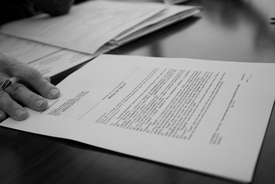Preparing Your Will: Step-by-Step: Difference between revisions
Drew Jackson (talk | contribs) |
Drew Jackson (talk | contribs) |
||
| Line 64: | Line 64: | ||
A will often isn’t read until after the funeral. As a result, most wills don’t include details relating to the funeral service. You should tell the executor or your family or leave a letter saying what kind of ceremony you want when you die, and whether you want to be buried or cremated. | A will often isn’t read until after the funeral. As a result, most wills don’t include details relating to the funeral service. You should tell the executor or your family or leave a letter saying what kind of ceremony you want when you die, and whether you want to be buried or cremated. | ||
Any assets you own jointly with others don’t need to be included in your will. These assets go directly to the surviving joint owner on your death. They don’t form part of your estate, but are said to "pass outside the will. | Any assets you own jointly with others don’t need to be included in your will. These assets go directly to the surviving joint owner on your death. They don’t form part of your estate, but are said to "pass outside the will". For example, if you and your spouse own your home as joint tenants, the home goes directly to your spouse on your death. | ||
Also, assets where you have designated a beneficiary don’t need to be included in your will. For example, retirement benefit plans such as RRSPs and RRIFs, where you have named a beneficiary under the plan, pass outside the will. When you die, the bank or trust company transfers the RRSP or RRIF, or pays it out, to the beneficiary you named. | Also, assets where you have designated a beneficiary don’t need to be included in your will. For example, retirement benefit plans such as RRSPs and RRIFs, where you have named a beneficiary under the plan, pass outside the will. When you die, the bank or trust company transfers the RRSP or RRIF, or pays it out, to the beneficiary you named. | ||
| Line 72: | Line 72: | ||
{{PLSTipsbox | {{PLSTipsbox | ||
| text = You can designate the beneficiary of a life insurance policy or benefit plan in your will, even though the proceeds “pass outside the will” and don’t form part of your estate. If you do, the beneficiary designation will alter any previous designation. Similarly, a beneficiary designation you make in your will may be altered by a later designation that is not in a will. | | text = You can designate the beneficiary of a life insurance policy or benefit plan in your will, even though the proceeds “pass outside the will” and don’t form part of your estate. If you do, the beneficiary designation will alter any previous designation. Similarly, a beneficiary designation you make in your will may be altered by a later designation that is not in a will. | ||
}} | }} | ||
=== Does the law say you have to leave your estate to your family? === | === Does the law say you have to leave your estate to your family? === | ||
Revision as of 23:10, 24 April 2017
| This information applies to British Columbia, Canada. Last reviewed for legal accuracy by Helen Low, QC in January 2016. |

You can make a will on your own, or have someone such as a lawyer or a notary public help you. There are rules and formalities that must be followed, no matter how simple the will, or the will may not be valid.
The person making a will is referred to as the will-maker.
Requirements for a will
For a will to be valid:
- The will must be in writing. It can be typed or handwritten.
- The will must be signed at its end by the will-maker. As the will-maker, you must sign the will or acknowledge the signature as yours in front of two witnesses present at the same time. If you are unable to sign the will because of illness or disability, you can ask someone to sign it for you in front of you, and in front of the two witnesses.
- The two witnesses must sign the will in front of you. You and the witnesses should initial each page of the will in front of each other.
- The will must have the date included on it.
Who can make a will?
To make a will, you must:
- be age 16 or over,
- be mentally capable of managing your own affairs, and
- freely agree with the contents of the will at the time you make it; in other words, if it is proven in court that someone has pressured you to make a will that doesn’t represent your intentions, the will is not valid.
In considering whether a person is mentally capable to make a will, key factors are:
- Do they understand the nature of a will?
- Do they understand the extent of their property?
- Do they appreciate the claims to which they ought to give effect? Put another way, if someone is being excluded from the will who would inherit a portion of the estate if there was no will, does the will-maker appreciate the effect of their decision? For example, if they leave their child out of the will, does the will-maker appreciate the effect of that decision?
Who can be a witness to your will?
Your two witnesses must:
- be age 19 or over, and
- be mentally capable.
It used to be that a person who witnessed a will could not also receive a gift under the will. But now, a witness may be able to inherit under a will. The witness has to apply to court and show that you intended to make the gift even though the person was a witness to the will. If the court isn’t satisfied, the gift to the witness is void. Either way, the remainder of the will is not affected.
Ultimately, it remains good practice for your witnesses not to be people - or the spouses of people - who are named as executors, alternate executors, or beneficiaries under the will.
The witnesses do not need to read the will. All they need to do is watch you sign your name to the will, and sign the will themselves in front of you.
Elements of a will
Typically, a will has several sections:
- Initial matters: The first section of the will appoints the executor. The executor is the person who is responsible for carrying out the instructions in the will. The will can specify the extent of the executor’s powers in administering the estate.
- Distribution of the estate: The will sets out who receives your possessions and property, also known as your assets, and under what conditions. The people to whom you give things are called beneficiaries. You can make gifts of specific property or cash gifts. Whatever amount left over after debts and taxes are paid and gifts are distributed is called the residue of the estate. In the will, you say who receives the residue, and in what portions.
- Other details: The will can also include other details as you wish. For example, if you have any children under age 19, you should name a guardian for them in the will. You should also provide for financial assistance for the guardian to cover the costs of raising the children.
- Signatures: The last section of the will includes the signatures of the will-maker and witnesses.
How detailed does your will need to be?
Your instructions in the will should be clear and specific.
You need to be specific about exactly who the beneficiaries are. For example, you should not say that you want to leave everything to "my best friend" or "my cousins".
 |
"I have no spouse or children of my own. I want to leave my belongings to my niece after my death. I wrote into my will her full name and relationship to me: '...to give the residue of my estate to my niece, Daniella Cortez....'" - Paulo, Vancouver |
You don’t need to write down every specific item you own. You only need to be specific about who should get what when it comes to items of special value, especially if you want to make certain the item goes to a particular person.
 |
"I want my son Michael to receive my grandfather’s gold watch. In my will, I included that gift: '...to transfer my Omega gold watch to my child, Michael Chen…' I left out any mention of my other clocks, as they weren't special in any way." - Lin, North Vancouver |
What should not be included in your will?
A will often isn’t read until after the funeral. As a result, most wills don’t include details relating to the funeral service. You should tell the executor or your family or leave a letter saying what kind of ceremony you want when you die, and whether you want to be buried or cremated.
Any assets you own jointly with others don’t need to be included in your will. These assets go directly to the surviving joint owner on your death. They don’t form part of your estate, but are said to "pass outside the will". For example, if you and your spouse own your home as joint tenants, the home goes directly to your spouse on your death.
Also, assets where you have designated a beneficiary don’t need to be included in your will. For example, retirement benefit plans such as RRSPs and RRIFs, where you have named a beneficiary under the plan, pass outside the will. When you die, the bank or trust company transfers the RRSP or RRIF, or pays it out, to the beneficiary you named.
The same is true if you have life insurance that names a beneficiary.
 |
You can designate the beneficiary of a life insurance policy or benefit plan in your will, even though the proceeds “pass outside the will” and don’t form part of your estate. If you do, the beneficiary designation will alter any previous designation. Similarly, a beneficiary designation you make in your will may be altered by a later designation that is not in a will. |
Does the law say you have to leave your estate to your family?
In general, you are free to leave your estate to whomever you want. However, the law does require that you make adequate provision for the proper maintenance and support of your spouse and children. Your spouse or children can apply to court for a portion of the estate that is "adequate, just and equitable in the circumstances."
Spouse includes a common-law spouse, which is a person you have lived with in a marriage-like relationship for at least two years.
If your spouse or children wish to dispute your will because they feel they have not been adequately provided for, they have to apply to court within 180 days after probate has been granted. (Probate is a legal procedure that confirms the will is legally valid and can be acted on.) The person disputing the will needs to prove in court that the will does not provide for them adequately.
Separated spouses generally have no legal claim to dispute the arrangements made in your will. Other relatives who are left out also generally have no claim.
 |
If you want to leave a spouse or child out of your will, you should explain this in a separate document or letter, kept with your will. You need to show that you have considered them
and your obligation to provide for them. This does not guarantee that they will not receive something if they dispute the will in court. You should seek legal advice. |
Making the will
When should you make a will?
You can make a will at any time. You should make a will if you marry or if you start a family. Even if you don’t marry or have children, or don’t have significant property, it’s still a good idea to make a will so that you can leave your belongings to the special people in your life.
 |
You should try to make a will when you are in good health. To make a will, you need to be mentally capable. Your mental capability can be affected by illness, an accident, or drug treatment. If you are proven to have been mentally incapable when you made your will, it will be considered void and of no legal effect. |
Do you have to get legal help to make a basic will?
With good do-it-yourself materials, it’s not too difficult to make a will that takes care of basic concerns, such as leaving a home, investments, and personal items to loved ones.
However, getting professional help to make a basic will does not cost very much, and having your will made by a lawyer or notary public is the safest way to avoid mistakes. Using an experienced lawyer or notary can give you the peace of mind of knowing that your will is properly drafted and valid, and that your affairs will be handled according to your wishes.
Getting advice from a lawyer or notary becomes particularly important where there are features such as a blended family, a charitable gift, property outside of British Columbia, a family business, a desire to hold property in trust for someone (such as a child), or a wish to disinherit potential beneficiaries.
Ask a lawyer or notary how much it will cost before you decide to give the job to him or her. To find a lawyer or notary, see the "Where to Get Help" section.
| ||||||||||||||||||||||||||

